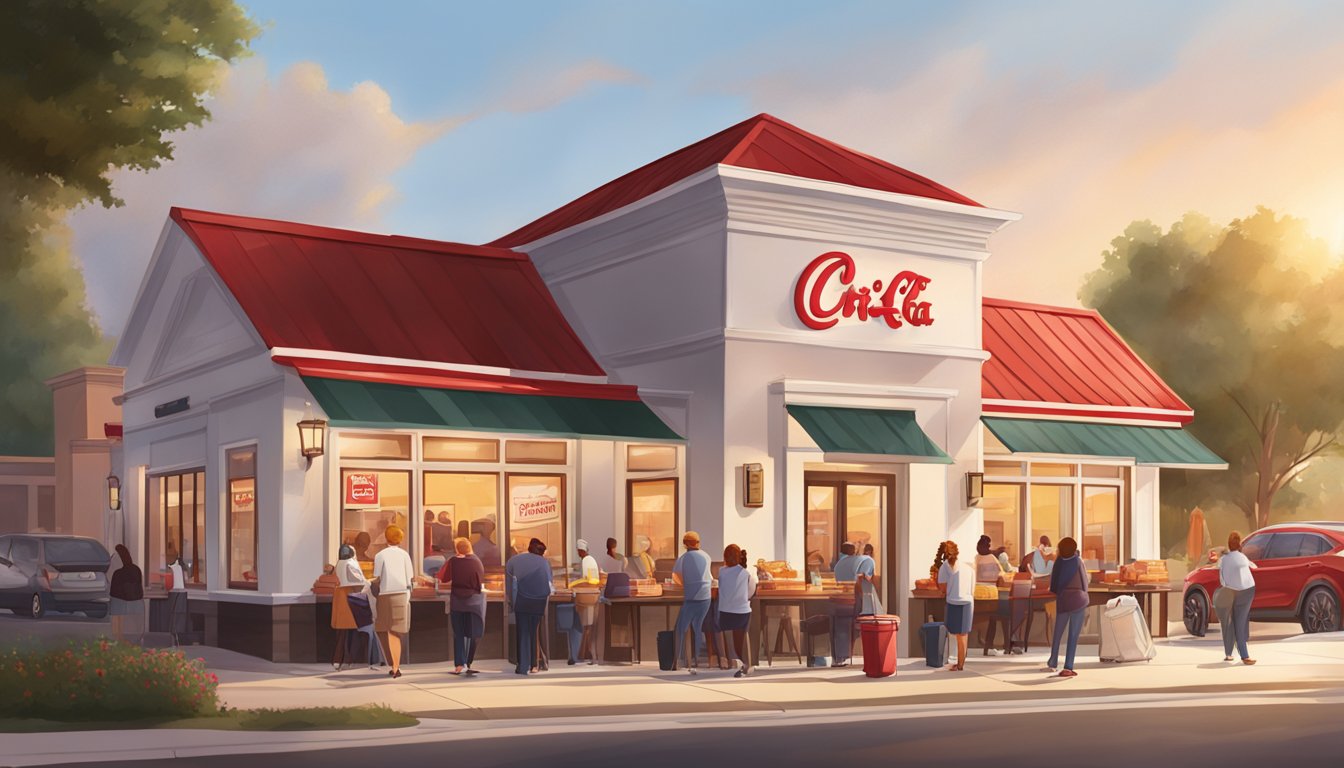Chick-fil-A’s breakfast menu has become an integral part of Southern culture, representing more than just a morning meal. The restaurant chain’s breakfast offerings embody the region’s culinary traditions and values, blending convenience with a touch of Southern hospitality.
Chick-fil-A’s breakfast items, particularly the chicken biscuit, have achieved iconic status in the South, serving as a comforting and familiar start to the day for many. This popularity stems from the combination of quality ingredients, consistent flavors, and the restaurant’s deep-rooted connection to Southern identity. The breakfast menu reflects the region’s love for hearty, satisfying meals that bring people together.
The cultural significance of Chick-fil-A’s breakfast extends beyond the food itself. It has become a shared experience, a daily ritual for many Southerners that reinforces community bonds and regional pride. The restaurant’s breakfast service has seamlessly integrated into the fabric of Southern life, becoming a cherished tradition that continues to evolve while maintaining its core appeal.
The History of Chick-fil-A
Chick-fil-A’s journey from a small diner to a fast-food empire spans decades of innovation, growth, and unwavering commitment to core values. The company’s story is deeply intertwined with its founder’s vision and principles.
Origins at Dwarf Grill
In 1946, S. Truett Cathy opened the Dwarf Grill in Hapeville, Georgia. This small diner near Atlanta’s airport marked the beginning of Cathy’s culinary career. The restaurant quickly gained popularity for its quality food and customer service.
Cathy experimented with chicken recipes, leading to the creation of the original Chick-fil-A sandwich in 1964. This boneless chicken breast served on a bun with pickles became the foundation of the future fast-food chain.
Expansion and National Presence
Chick-fil-A’s first official restaurant opened in 1967 at Atlanta’s Greenbriar Mall. This location introduced the innovative concept of mall-based fast-food restaurants.
The company’s growth accelerated in the following decades. By the 1980s, Chick-fil-A had expanded beyond its Southern roots, opening locations across the United States.
Chick-fil-A’s menu evolved to include breakfast items, salads, and wraps, while maintaining focus on its signature chicken sandwich.
The Legacy of S. Truett Cathy
S. Truett Cathy’s leadership shaped Chick-fil-A’s corporate culture and values. He instilled principles of customer service, quality, and moral values into the company’s operations.
One of Cathy’s most notable decisions was to close all Chick-fil-A restaurants on Sundays, a practice that continues today.
Cathy’s son, Dan Cathy, took over as CEO in 2013, maintaining the company’s commitment to its founding principles while guiding its continued growth and innovation.
Culinary Innovation in Fast Food

Chick-fil-A revolutionized fast food breakfast with its creative menu items and commitment to quality ingredients. The chain’s culinary innovations have set new standards in the industry.
Creation of the Chicken Biscuit
Chick-fil-A introduced the Chicken Biscuit in 1986, transforming morning menus across the fast-food landscape. This signature item features a hand-breaded chicken fillet nestled in a freshly-baked buttermilk biscuit.
The Chicken Biscuit quickly became a breakfast staple, appealing to customers seeking a hearty morning meal. Its popularity prompted other chains to develop similar offerings, sparking a breakfast sandwich revolution in the industry.
Chick-fil-A’s dedication to using high-quality ingredients and perfecting cooking techniques contributed to the Chicken Biscuit’s success. The chain’s focus on chicken expertise allowed them to create a product that stood out in the crowded breakfast market.
Evolution of Breakfast Menu Items
Chick-fil-A continually expanded its breakfast offerings to cater to changing consumer preferences. The chain introduced items like the Egg White Grill, providing a lighter option for health-conscious customers.
The breakfast menu grew to include:
- Hash Brown Scramble Bowls
- Greek Yogurt Parfait
- Chicken, Egg & Cheese Bagel
These additions demonstrated Chick-fil-A’s ability to innovate while maintaining its core focus on chicken. The chain also embraced customization, allowing customers to modify menu items to suit their tastes.
Seasonal and limited-time offerings kept the breakfast menu fresh and exciting. These special items often incorporated regional flavors or trendy ingredients, showcasing Chick-fil-A’s culinary creativity.
Quality of Ingredients and Menu Offerings
Chick-fil-A’s commitment to quality sets it apart in the fast-food industry. The chain uses chicken raised without antibiotics and prepares food fresh in-restaurant daily.
Key quality initiatives include:
- Hand-breading chicken fillets
- Using real lemon juice in lemonade
- Preparing salads with fresh produce
This focus on ingredients extends to breakfast items. Biscuits are baked fresh throughout the morning, ensuring customers receive a hot, flaky product.
Chick-fil-A’s attention to detail in food preparation has earned it a reputation for serving superior fast food. The chain’s dedication to quality resonates with customers seeking better breakfast options in a quick-service setting.
Cultural Impact and Brand Identity

Chick-fil-A’s breakfast offerings have become deeply intertwined with Southern culture and the company’s overall brand identity. The chain’s marketing strategies, customer loyalty, and embrace of Southern hospitality have all contributed to its cultural significance.
Advertising and the ‘Eat Mor Chikin’ Campaign
The ‘Eat Mor Chikin‘ campaign has been a cornerstone of Chick-fil-A’s marketing since 1995. This clever campaign features cows encouraging people to eat chicken instead of beef. The intentional misspellings and cow mascots have become instantly recognizable across the United States.
The campaign’s success lies in its humor and consistency. Billboards, TV commercials, and social media posts all reinforce this message. The cows have become beloved characters in their own right, appearing on merchandise and at events.
This advertising approach has helped Chick-fil-A stand out in a crowded fast-food market. It’s also made the brand’s breakfast offerings more memorable and appealing to consumers.
Brand Loyalty and American Culture
Chick-fil-A has cultivated a remarkably loyal customer base, particularly in the South. This loyalty extends to the chain’s breakfast menu, with many customers making it part of their daily routine.
The brand’s commitment to quality food and customer service has played a significant role in building this loyalty. Chick-fil-A’s chicken biscuits and other breakfast items are often cited as superior to competitors’ offerings.
The company’s values and community involvement have also contributed to its cultural impact. Chick-fil-A’s Christian roots and charitable efforts resonate with many Americans, particularly in more conservative regions.
This strong brand loyalty has made Chick-fil-A a cultural touchstone. References to the chain appear in movies, TV shows, and social media, cementing its place in American pop culture.
Chick-fil-A and Southern Hospitality
Chick-fil-A’s approach to customer service embodies the concept of Southern hospitality. This is evident in their breakfast service, where employees are known for their politeness and attentiveness.
The phrase “My pleasure” has become synonymous with Chick-fil-A’s service philosophy. This small touch adds a personal feel to each interaction, even during busy breakfast rushes.
The chain’s commitment to hospitality extends beyond individual interactions. Many Chick-fil-A locations host community events and fundraisers, further integrating the brand into local culture.
This emphasis on hospitality has helped make Chick-fil-A’s breakfast a comforting and welcoming experience for customers. It’s a key factor in the chain’s cultural significance, particularly in the South.
The Customer Experience
Chick-fil-A’s breakfast offerings in the South are complemented by their renowned customer service approach. This combination creates a unique dining experience that has become a cultural touchstone in the region.
Second-Mile Service Philosophy
Chick-fil-A’s “Second-Mile Service” philosophy forms the cornerstone of their customer experience. This approach encourages employees to go above and beyond basic expectations. Staff members are trained to anticipate customer needs and provide proactive assistance.
Employees often use phrases like “my pleasure” instead of “you’re welcome,” creating a more personalized interaction. This commitment to service extends to small details, such as refilling drinks without being asked or escorting customers to their tables with umbrellas during rainy weather.
The company invests heavily in employee training programs to ensure consistent service quality across all locations. This dedication to excellence has helped Chick-fil-A build a loyal customer base and distinguish itself in the competitive fast-food market.
Customer Service and Hospitality
Chick-fil-A’s emphasis on hospitality is evident in their breakfast service. Staff members are trained to greet customers warmly and maintain a positive attitude throughout interactions. This approach creates a welcoming atmosphere for early morning diners.
The restaurant’s layout and design are carefully planned to enhance the customer experience. Clean dining areas, efficient ordering systems, and attentive staff contribute to a smooth breakfast service.
Chick-fil-A also prioritizes food quality and presentation. Breakfast items are prepared fresh and served promptly. Special dietary requests are accommodated whenever possible, demonstrating the company’s commitment to customer satisfaction.
Local Events and Community Engagement
Chick-fil-A actively participates in local events and community initiatives, particularly during breakfast hours. Many locations host “Breakfast with Santa” during the holiday season or sponsor local school breakfast programs.
The company encourages franchise owners to engage with their communities. This may include supporting local charities, sponsoring youth sports teams, or participating in community clean-up efforts.
Some Chick-fil-A locations offer meeting spaces for community groups during breakfast hours. This practice fosters a sense of community and positions the restaurant as a local gathering place.
These community engagement efforts help integrate Chick-fil-A into the fabric of Southern communities, reinforcing its cultural significance beyond just a breakfast destination.
Ethics and Social Responsibility

Chick-fil-A’s corporate values emphasize service and community impact. The company has implemented several initiatives to support education, marriage equality, and local communities.
Scholarships and Educational Support
Chick-fil-A invests heavily in educational programs for its employees. In 2021, the company awarded $15 million in scholarships to 6,000 team members. This commitment to education extends beyond financial support. Chick-fil-A also offers leadership development programs and mentorship opportunities for its staff.
The Remarkable Futures Scholarship program provides both full-time and part-time employees with funds for college education. This initiative has helped thousands of workers pursue higher education while working at Chick-fil-A restaurants.
Statement on Marriage and Controversies
Chick-fil-A’s stance on marriage has sparked public debate. The company’s Christian beliefs have influenced its corporate policies and philanthropic efforts. In 2012, CEO Dan Cathy’s comments supporting traditional marriage led to boycotts and criticism from LGBTQ+ rights advocates.
Since then, Chick-fil-A has aimed to separate its business practices from political and social issues. The company now focuses on serving all customers equally, regardless of personal beliefs or orientations. This shift has helped Chick-fil-A maintain its popularity while navigating complex social topics.
Community Involvement and the Chick-fil-A Foundation
The Chick-fil-A Foundation spearheads the company’s philanthropic efforts. It supports local communities through various programs and partnerships. The foundation focuses on three key areas: education, hunger relief, and youth development.
Chick-fil-A restaurants often participate in local events and fundraisers. They provide food donations to schools, churches, and community organizations. The company’s disaster relief program also assists communities affected by natural disasters.
In 2019, Chick-fil-A announced changes to its charitable giving strategy. The company now directs its philanthropy towards causes with less controversial associations, such as fighting hunger and homelessness.




